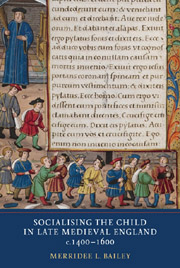Book contents
- Frontmatter
- Contents
- Acknowledgements
- Abbreviations
- Transcription conventions
- Introduction
- 1 Courtesy Poems
- 2 Readers
- 3 Virtue and Vice
- 4 Sixteenth-Century Books
- 5 The School
- Conclusion
- Appendix A Appendix A: English Vernacular Courtesy Poems
- Appendix B Incunabula
- Appendix C Sixteenth-Century Books
- Appendix D Educational Sources
- Bibliography
- Index
- YORK MEDIEVAL PRESS: PUBLICATIONS
3 - Virtue and Vice
Published online by Cambridge University Press: 05 April 2013
- Frontmatter
- Contents
- Acknowledgements
- Abbreviations
- Transcription conventions
- Introduction
- 1 Courtesy Poems
- 2 Readers
- 3 Virtue and Vice
- 4 Sixteenth-Century Books
- 5 The School
- Conclusion
- Appendix A Appendix A: English Vernacular Courtesy Poems
- Appendix B Incunabula
- Appendix C Sixteenth-Century Books
- Appendix D Educational Sources
- Bibliography
- Index
- YORK MEDIEVAL PRESS: PUBLICATIONS
Summary
‘I aduyse euery gentilman or woman hauyng such children desyryng them to be vertuously brought forth to get and haue this book to thende that they may lerne hou they ought to gouerne them vertuously in this present lyf’
The manner in which printed books established new moral and virtuous impulses as part of the rhetoric of upbringing reflects increasing complexity in how courtesy, morality and socialisation were understood in the late fifteenth century. Courtesy manuscripts, while still available and circulating within and around households, were now matched by the London-based distribution of printed books. The extent to which texts from the existing body of English vernacular work were chosen for print and circulated outwards from London's printing trade is evidence that the readership for literature concerned with children's behaviour was changing.
The role of printers in determining reading choices was a development in England's reading culture which was almost entirely new, and from it emerges a different sense of the history of the printed book in relation to scribal activities. William Caxton's productivity at his Westminster workshop extended the reach and breadth of courtesy and instructional literature by manipulating it for the new dynamic printing press. Socialising literature would eventually become an integral part of the printed reading and literary networks in England. Comparing courtesy themes as they appeared in extant manuscripts and those printed by Caxton becomes a way of seeing how early printers developed authority in preserving and altering ideologies in the socialising process.
- Type
- Chapter
- Information
- Socialising the Child in Late Medieval England, c. 1400–1600 , pp. 79 - 126Publisher: Boydell & BrewerPrint publication year: 2012



